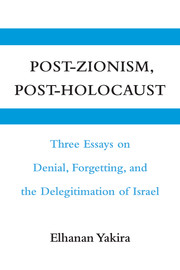3 - On the Political and the Antipolitical
Hannah Arendt, Eichmann, and Israel
Published online by Cambridge University Press: 05 June 2012
Summary
ARENDT AND THE COMMUNITY OF OPPROBRIUM
The name of Hannah Arendt has come up several times in this discussion. In fact, her spirit hovers over this whole book. Her name and her writings are connected in one way or another to the whole range of questions, the pain and guilt, the anger and the self-righteousness surrounding the relationship between Israel and the Holocaust. Because she was an important thinker (some say the most important political philosopher of the twentieth century); because of her sustained interest in totalitarianism and the Nazi regime in particular, on the one hand, and in Jewish matters and Israel, on the other; because of her influence on political theory, which has only grown in recent years; because of her personality and biography; and, above all, because of her book on the Eichmann trial, Arendt is an obligatory reference point for any consideration of the question with which we are concerned here. A further reason is that she made a real, if only partly intended, contribution to the use of the Holocaust in the ideological struggle against Israel.
The Arendt literature has become of late so rich, if not always in quality at least in quantity, that it is practically impossible to cover it all. Some good work has been done in this vast field, and some less good, both serious scholarship and ridiculous hagiography.
- Type
- Chapter
- Information
- Post-Zionism, Post-HolocaustThree Essays on Denial, Forgetting, and the Delegitimation of Israel, pp. 220 - 302Publisher: Cambridge University PressPrint publication year: 2009



